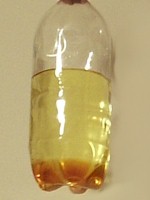Before filling your tank with biodiesel, vegetable oil, or any other biofuel, it is essential to find out whether your car is compatible. Mistakes can be very expensive to rectify – at best your car won’t run, at worst you could destroy your engine!
The first thing to consider is the fuel your car currently uses. If you car runs on petrol then you do not need to read any further. Biodiesel is not a suitable fuel for spark ignition engines and considerable damage is likely to occur if you attempt to run your car on biodiesel.
The green alternative to petrol is Ethanol usually mixed with standard fossil fuel petroleum. Find out more by clicking the Ethanol link above.
Biodiesel and Vegetable Oil
The term biodiesel if often used with reference to true biodiesel, straight vegetable oil SVO (unused rape seed or corn oil usually), and waste vegetable oil WVO (used vegetable oil from restaurants etc). Diesel Engines (compression ignition engines) can nearly all be run on biodiesel without modification. If you plan to use straight vegetable oil, some modification is usually necessary (Mercedes and Volvo vehicles aside), and if you plan to use waste vegetable oil modification is always necessary and you will need to process your fuel before use.
Biodiesel
Biodiesel is a stronger solvent than standard mineral diesel and so all the accumulated gunge in the tank and pipes from years of driving dissolves into the new fuel. When the biodiesel is pumped through to the fuel filter these particles are deposited potentially blocking the filter. Shortly after starting to use biodiesel it is usually necessary to replace the fuel filter at least once. After that the pipes and tank are clean and fuel filters will only need replacing at standard service intervals and you will have a much cleaner car.
Biodiesel’s solvent powers also make it hard on any old style rubber piping. All rubber piping and other rubber parts in contact with fuel should be immediately replaced with modern hard-wearing long life nylon pipes to prevent problems. Most modern cars no longer have true rubber parts and so this may not be an issue.

Click here to view our biodiesel recipe, and here to read about Jatropha – a plant which will grow in the harshest conditions and produces oily fruits, perfect for making biodiesel.
(Click here to read about the Diesel Tree – a tree which can be tapped for oil much as a rubber tree is tapped for its latex.)
Straight Vegetable Oil
Vegetable oil is more viscous than mineral diesel – i.e. it is thicker. Particularly on cold days and when the engine is cold you would have difficulties starting a car on vegetable oil. However, once the engine (or fuel) is warm everything should run as it would (or better than it did) on diesel. Therefore there are a few options to consider:
Dual Fuel System
Start the car with diesel/biodiesel and then switching to SVO when everything is warmed up. Before turning off the engine you need to switch back to diesel so that the injectors and fuel lines contain diesel. This means the engine will start next time you use the car, and it will prevent fuel freezing in the fuel lines during cold weather conditions.
Mixed Fuel
Vegtable oil can be mixed with diesel in the main tank at different ratios depending on the weather conditions. The warmer the weather, the higher the percentage of vegetable oil that can be used.
Conversion
Fit a fuel preheater in the tank, a heat exchanger to warm fuel, and/or a heated fuel filter.
A typical straight vegetable oil conversion will have a fuel preheater which warms up the SVO sufficiently to get the engine started, and then a heat exchanger which uses the heat from the water in the radiator to warm the SVO fuel while the engine is running.
Waste Vegetable Oil
Waste vegetable oil is the cheapest fuel to use, but requires the most work on the part of the car owner. If you car runs on straight vegetable oil, then it should run without problem on waste vegetable oil – as long as the oil is correctly processed before use. Find out more about Processing Waste Vegetable Oil here.
NEW Click here to read about a Vegetable Oil Two Tank Conversion.
Maintenance
An engine will usually run more smoothly on vegetable oil, and be better lubricated than with mineral diesel therefore lasting much longer. However, it is essential that you continue to maintain your engine properly and always keep a spare fuel filter handy in case you suffer from a blockage. In very cold weather you should add some mineral diesel to your fuel to prevent problems with freezing.
Biofuels and UK Law
Unfortunately you cannot just pop to your local supermarket and stock up on cheap vegetable oil and fill your vehicle. Tax must be paid on any oil of any origin which is used to power a road vehicle. Click here to read our article Tax on Biofuels (UK specific information).